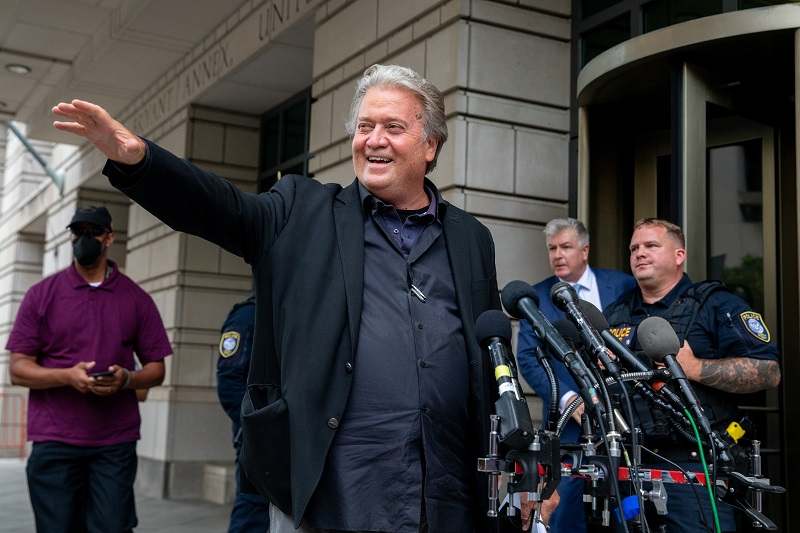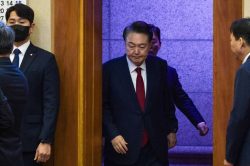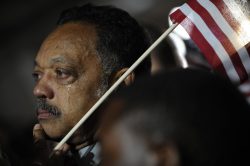
Steve Bannon speaks to crowds outside of the E. Barrett Prettyman U.S. Courthouse in Washington
11:27 JST, July 23, 2022
WASHINGTON – Steve Bannon, the right-wing podcaster and longtime confidante of former president Donald Trump, was convicted Friday of contempt of Congress for his refusal to provide documents or testimony to a House committee probing the Jan. 6, 2021, attack.
Bannon, 68, is the closest person to Trump to be convicted of a crime amid the fallout from the attack on the Capitol, which occurred as lawmakers met to formally tally the 2020 presidential election result. The contempt case involved legislative efforts to investigate the Jan. 6 violence and what led up to it, however, rather than the actual events of the day.
The trial, which lasted a week and only featured two witnesses, tested a rarely used criminal statute meant to ensure people comply with congressional subpoenas. The verdict, after 2 1/2 hours of jury deliberations, sent a message to other potential committee witnesses, the panel’s chair and vice chair said in a joint statement.
“The conviction of Steve Bannon is a victory for the rule of law and an important affirmation of the Select Committee’s work,” Rep. Bennie Thompson, D-Miss., the chairman, and Rep. Liz Cheney, R-Wyo., the vice chair, said. “Just as there must be accountability for all those responsible for the events of January 6th, anyone who obstructs our investigation into these matters should face consequences.”
As he prepared for trial, Bannon had vowed to go “medieval” on his enemies. But most of his legal arguments were rejected by the trial judge, U.S. District Judge Carl J. Nichols, and the tough-talking defendant ended up calling no witnesses.
As he waited for the verdict, Bannon did not show much emotion, fiddling with a black mask on the defense table. His hand went still as “guilty” was read twice. Outside of the courthouse, Bannon appeared unperturbed, thanking the jury, the judge and the court workers.
“I only have one disappointment,” he said. “And that is the gutless members of that show trial committee, the J6 committee, didn’t have the guts to come here and testify.”
In closing arguments earlier in the day, Assistant U.S. Attorney Molly Gaston told jurors that the case “is not complicated, but it is important . . . The defendant chose allegiance to Donald Trump over compliance with the law.”
Bannon’s lawyer, David Schoen, called the conviction “a foregone conclusion” based on pretrial rulings but said he would file a “bulletproof” appeal. “You’ll see this case reversed,” he predicted.
Nichols scheduled sentencing for Oct. 21. Each of the two misdemeanor charges is punishable by at least 30 days and up to one year in jail. But that does not guarantee Bannon will end up behind bars; no one has been incarcerated for contempt of Congress in more than half a century, since the red-baiting hearings of the Cold War era.
Gaston, in her closing, highlighted Bannon’s failure to respond or to produce a single document before the subpoena deadline, after which Bannon’s attorneys asserted that Trump intended to invoke executive privilege.
“When it really comes down to it, he did not want to recognize Congress’s authority or play by the government’s rules,” she said. “Our government only works if people show up. It only works if people play by the rules.”
“His belief that he had a good excuse not to comply does not matter,” Gaston told jurors, drawing out the final words to make the point.
In his closing argument, defense lawyer M. Evan Corcoran suggested that the committee’s subpoena was illegitimate and politically motivated, and that the deadlines for Bannon to comply were merely “placeholders” for further negotiation.
Bannon “didn’t intentionally refuse to comply with a subpoena. Absolutely not,” Corcoran said. “He didn’t intentionally refuse to comply with anything.”
Much of Bannon’s trial strategy seemed designed to bolster a future appeal.
Nichols had earlier rejected a host of potential defenses, including Bannon’s contention that Trump had claimed executive privilege over his testimony and documents. The judge, a 2019 Trump appointee who served in George W. Bush’s Justice Department from 2005 to 2009, said Bannon’s lawyers were mostly limited to the issue of whether their client understood the deadlines for answering lawmakers’ demands, and that otherwise his reasons for not complying were irrelevant.
He also said Bannon could argue whether he thought the window for compliance remained open.
On Friday, Nichols twice stopped Corcoran from offering arguments about the legitimacy of the subpoena that had previously been rejected.
Bannon’s attorneys have signaled they will appeal Nichols’ rulings that a defendant charged with contempt of Congress cannot raise as a defense that he or she was relying on the advice of counsel or believed their cooperation was barred by a president’s claim of executive privilege.
Nichols had said he would wait until jurors return a verdict or are discharged before ruling on a defense motion challenging two other issues: whether prosecutors have met their burden of proof, and the judge’s rejection of a defense request to call Thompson, the Jan. 6 committee chair, as a witness. He did not rule on those issues Friday afternoon.
In his closing, Corcoran took aim at the credibility of the main prosecution witness, Kristin Amerling, the chief counsel for the Jan. 6 committee and a longtime aide to Democratic lawmakers. He suggested that she and the Democrats on the committee were in a rush to score political points and punish Bannon, singling him out of more than 1,000 committee witnesses in an election year.
Gaston ridiculed that reasoning. “There is nothing political about figuring out why January 6 happened and how to make sure it never happens again,” she said. “And there is nothing political about enforcing the law against someone who, like the defendant, flouts it.”
After delivering their verdict, jurors left the courthouse without commenting.
Matthew M. Graves, the U.S. attorney whose office prosecuted the case, said after the trial that the subpoena “was not an invitation that could be rejected or ignored.” Bannon refused, he added, “and now a jury has found that he must pay the consequences.”
Stanley M. Brand, a former House counsel who has represented witnesses before the Jan. 6 committee and has been critical of some of the committee’s operations, said Bannon had at least a “50-50” chance at overturning the conviction on appeal. Brand reasoned that an appeals court might decide that Bannon should have been allowed to tell the jury he relied on advice from his lawyer about executive privilege.
The trial began Monday with a full day of jury selection, during which several potential jurors were dismissed because of their familiarity with or opinions of the Jan. 6 riot and subsequent investigations.
The prosecution witnesses were Amerling, who described how Bannon did not engage with the committee until after he had missed the first response deadline; and FBI Special Agent Stephen Hart, who talked about his conversation with a lawyer who represented Bannon in his dealings with the committee, as well as postings made by one of Bannon’s official social media accounts after he was subpoenaed.
Bannon is one of two former Trump aides to face criminal charges in connection with rebuffing the committee, along with former White House trade adviser Pete Navarro, whose trial is set for November.
The Justice Department has said it would not charge former Trump White House chief of staff Mark Meadows and communications chief Daniel Scavino Jr., who also were referred by Congress for potential criminal prosecution.
Unlike Bannon and Navarro, Meadows and Scavino engaged in months of talks with the committee over the terms and limits of potential testimony and executive privilege claims. Meadows also turned over thousands of text messages and communications with members of Congress and other White House aides before ending negotiations and withdrawing his appearance for a deposition.
And unlike the other three men, Bannon left the Trump White House in 2017 and was a private citizen at the time of the 2020 election and subsequent presidential transition.
Top Articles in News Services
-

Survey Shows False Election Info Perceived as True
-

Prudential Life Expected to Face Inspection over Fraud
-

Hong Kong Ex-Publisher Jimmy Lai’s Sentence Raises International Outcry as China Defends It
-

Japan’s Nikkei Stock Average Touches 58,000 as Yen, Jgbs Rally on Election Fallout (UPDATE 1)
-

Trump Names Former Federal Reserve Governor Warsh as the Next Fed Chair, Replacing Powell
JN ACCESS RANKING
-

Japan PM Takaichi’s Cabinet Resigns en Masse
-

Japan Institute to Use Domestic Commercial Optical Lattice Clock to Set Japan Standard Time
-

Israeli Ambassador to Japan Speaks about Japan’s Role in the Reconstruction of Gaza
-

Man Infected with Measles Reportedly Dined at Restaurant in Tokyo Station
-

Man Infected with Measles May Have Come in Contact with Many People in Tokyo, Went to Store, Restaurant Around When Symptoms Emerged




















